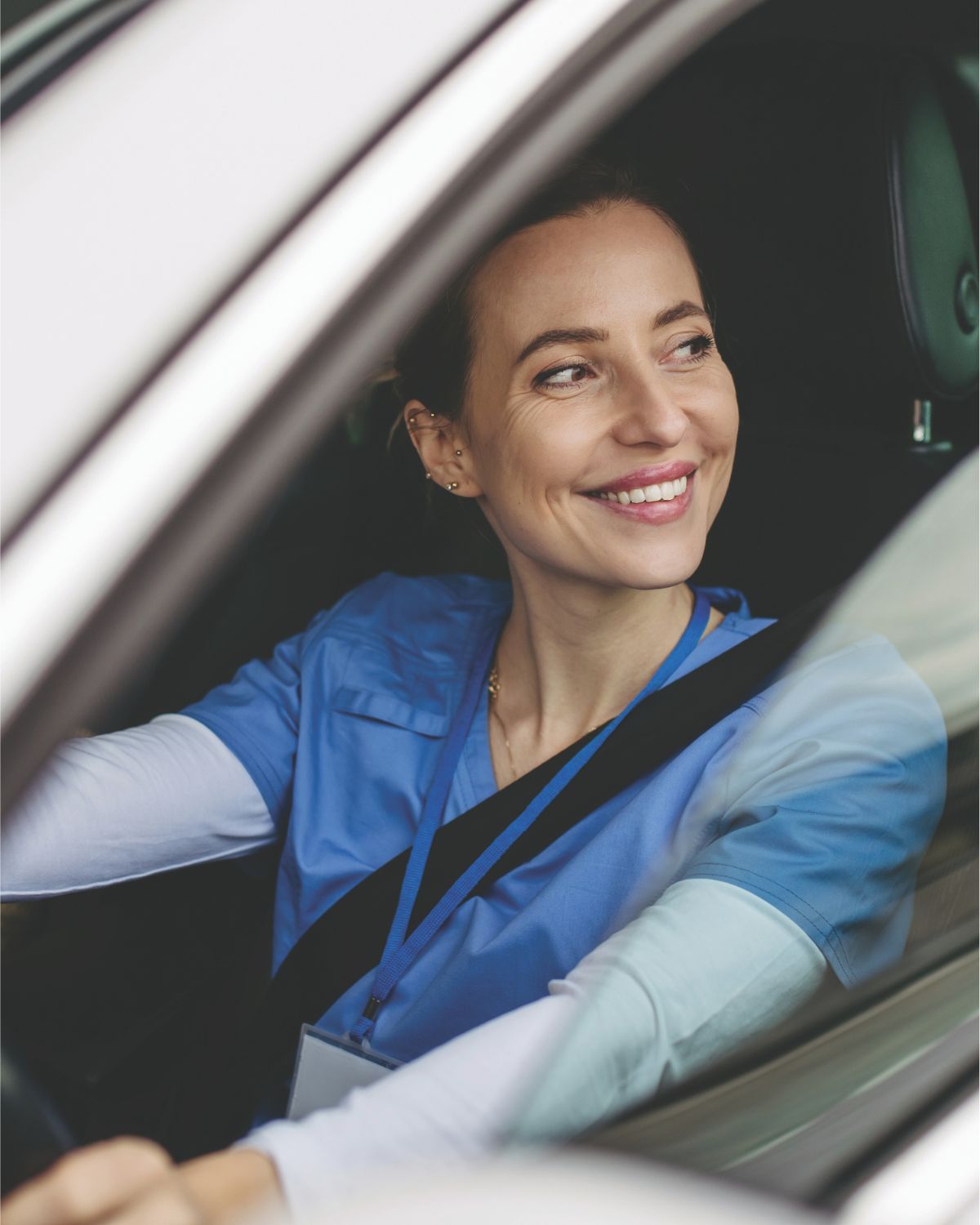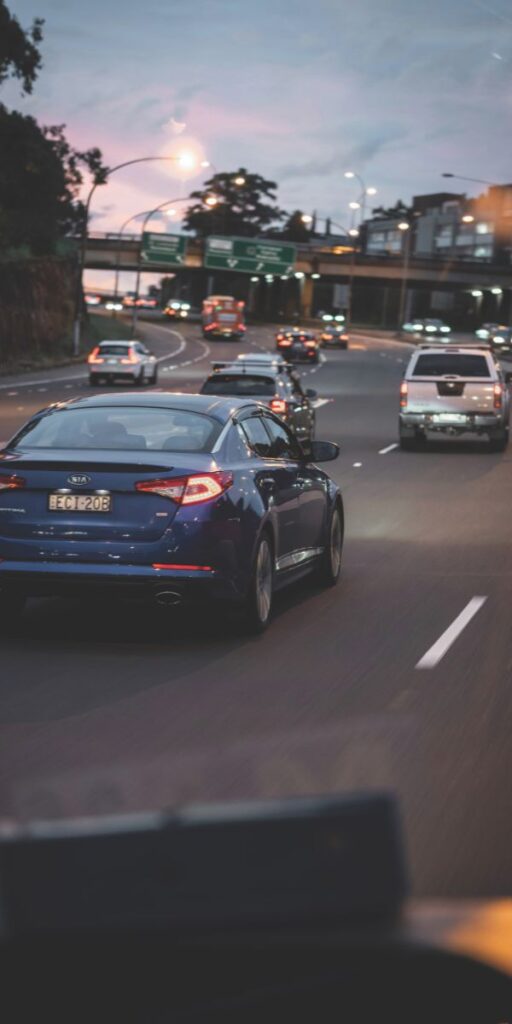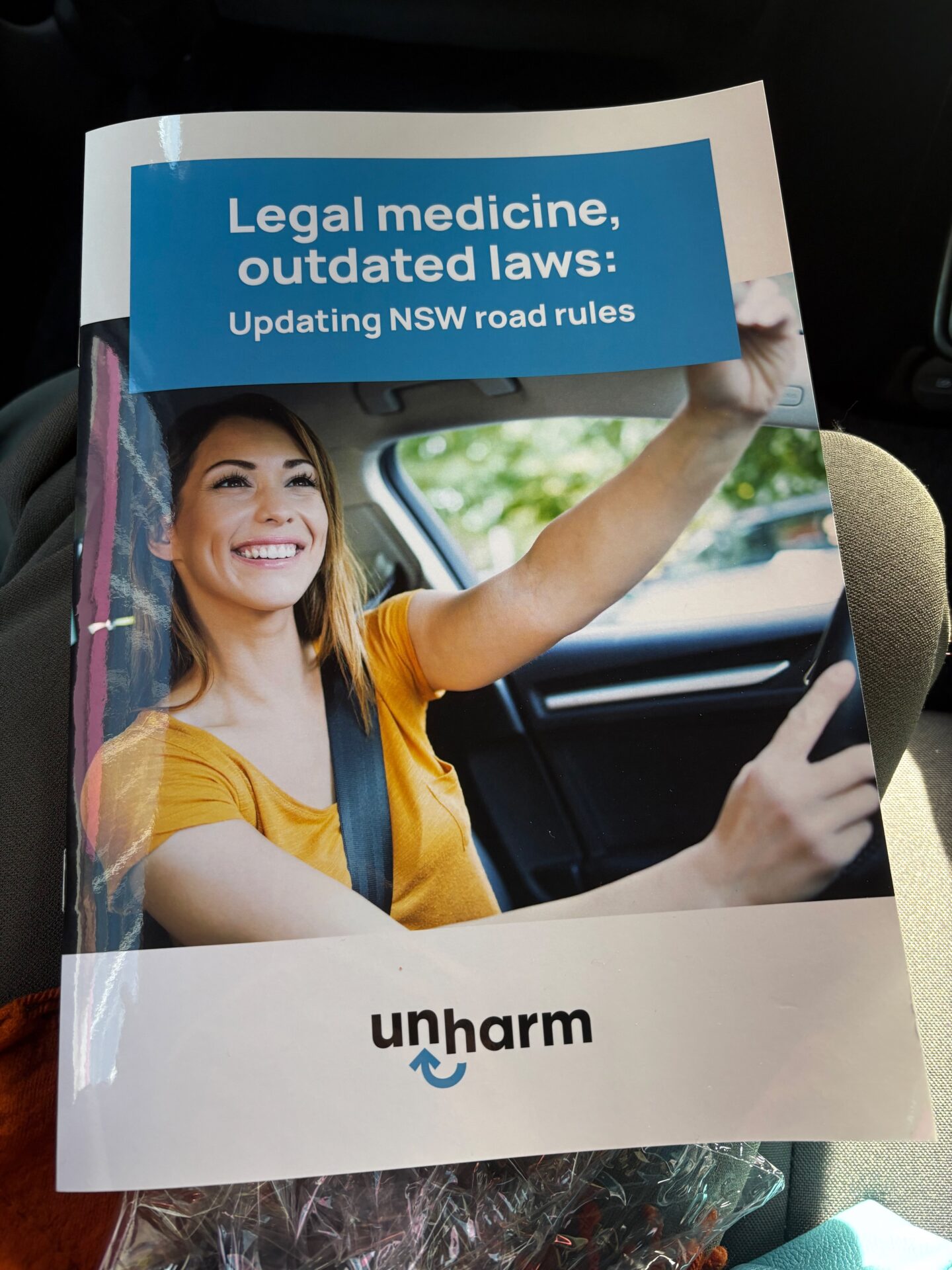The problem and the solution:
Patients prescribed medicinal cannabis should be allowed to drive responsibly, just like patients prescribed any other medicine
Thousands of people in NSW are banned from driving just for following their doctor’s advice. It’s unfair, and it’s time for change.

The problem in brief:
If your doctor prescribes medicinal cannabis containing THC, NSW road rules totally ban you from driving.
Medicinal cannabis can affect driving for a few hours after use, but these laws ban you from driving at any time, even when you’re clear-headed and able to drive responsibly.
This is the only legal medicine with a blanket driving ban. It’s out of date, unfair, and not backed by evidence.
We’re calling for a simple, safe reform: update the law so people with prescriptions can drive once the effect has passed, just like patients prescribed any other medicine.
Or scroll down to read more about the campaign below!
The problem in detail:
When medicinal cannabis became legal in Australia in 2016, NSW didn’t update its road laws. The result? An impossible situation for thousands of patients.
How the law works now: NSW makes it illegal to drive with any trace of THC in your system – even if you’re not impaired and even if it’s prescribed by a doctor.
Why this doesn’t make sense:
- THC traces can linger for days after the effects wear off
- Doctors can’t advise patients when it’s safe to drive (unlike every other medicine)
- We already have laws against impaired driving that cover all drugs
The impossible choice: Take your prescribed medicine OR keep your licence. You can’t do both.
The real impact: Patients lose their licences, face court, and void their insurance – not for dangerous driving, but for using prescribed medicine. Many lose their jobs, can’t care for family, or become isolated from their community.

Our solution:
Remove prescription medicinal cannabis from the list of “illicit drugs” for roadside testing purposes.
This would:
- Keep laws against impaired driving (that’s still dangerous and illegal)
- Let doctors advise patients on safe driving – like they do for all other medicines
- Stop punishing responsible patients who aren’t impaired
- Bring NSW in line with other places that already protect medical patients
Why this matters now
NSW politicians are already talking about this. The NSW Upper House and the 2024 Drug Summit both said this law needs fixing.
Every week more people lose their licence simply for following their doctor’s orders – not for dangerous driving, but for having medicine in their system hours or days after it stopped affecting them.
It’s time for NSW to catch up.
The evidence: Legal Medicine, Outdated Laws
Our campaign is based on solid research. We’ve written a detailed report called Legal Medicine, Outdated Laws that explains:
- What the science actually says about THC and driving
- How the current law harms real people
- What reforms work in other countries
Leading experts back our proposal – including medical researchers, road safety specialists, and legal professionals. Major organisations supporting change include the Lambert Initiative for Cannabinoid Therapeutics, NSW Aboriginal Legal Service, Australian Lawyers Alliance, NSW Nurses and Midwives Association, and Uniting.
We’ve sent this report to every NSW MP.
Download a copy of our report today, or scroll down for FAQs.
Download: Legal medicine, outdated laws

Driving ban FAQs
- We can’t allow drug driving.
We agree. No one should drive under the influence of any drug. This reform keeps strong laws against impaired driving in place. It simply ends the blanket ban that punishes unimpaired, responsible patients using legally prescribed medicine.
- Will this make roads less safe?
No. This reform keeps strong laws against driving while impaired. It simply means responsible patients with a valid medicinal cannabis prescription can keep driving when they are unimpaired, just like people prescribed any other medicine. Safety remains the priority.
- What would you say to a parent whose children were killed by a drug driver?
We share her grief. No one should lose a loved one because someone chose to drive impaired. That’s why we fully support effective laws against driving under the influence. But the current NSW law doesn’t measure impairment at all – it punishes people days after any effect has worn off. Real safety means targeting and removing impaired drivers, not banning responsible patients from the road.
- Doesn’t THC in your system mean you’re unsafe to drive?
No. THC residue in saliva is not the same as impairment. Roadside tests can detect it days or even weeks after use, long after any effect on driving has passed. The science is clear: the mere presence of THC does not reliably predict crash risk.
- What about cannabis and crash risk?
International evidence shows no link between legal medicinal cannabis programs and increased road fatalities. Real-world crash risk comes from impairment – just like with alcohol or fatigue. Presence-based laws don’t improve safety because they target people who aren’t impaired.
- Cannabis use increases crash risk and you’re saying that’s acceptable?
Absolutely not. Driving impaired by any substance – cannabis, alcohol, or anything else – is never acceptable. That’s why this reform keeps strict impairment laws in place. Research does not show that the mere presence of THC increases crash risk. There is no evidence of increased road trauma caused by THC residue once the impairment window has passed, and no coronial reports linking THC presence alone to causing crashes. For perspective, driving after less than six hours’ sleep or being over 75 years old carries comparable or higher risks.
- Isn’t this just about helping recreational users game the system?
Medicinal cannabis prescribing is tightly regulated in Australia, with medical oversight and official approvals. If misuse happens, that’s a health regulation issue – not a reason to punish genuine patients through road laws. We don’t take away medicines from all patients because a few might abuse the system.
- What if people fake a prescription?
Doctors and health authorities already have safeguards to detect and address fraud. NSW Police already have standard operating procedures to identify legitimate prescriptions for any medication, and specific procedures for checking medical cannabis prescriptions. Road laws should focus solely on keeping impaired drivers off the road, not policing medical legitimacy.
- How can police tell if cannabis was legal or illegal?
Police already have procedures to check medicinal cannabis prescriptions in other situations. The only barrier for roadside stops is the Road Transport Act’s blanket THC offence. If that restriction is removed, police can simply use the same existing training and systems to check prescriptions during roadside stops, just as they already do in other situations.
- Don’t roadside drug tests save lives?
There’s no evidence that testing for THC residue alone improves road safety. Responsible patients who are safe to drive already do so every day without causing increased crashes.
- Isn’t testing needed for deterrence?
Laws work best when they’re fair and targeted. Punishing responsible drivers undermines trust and wastes resources. Education about impairment and responsible use is a more effective way to keep roads safe.
- What about the Victorian approach?
There’s been confusion about Victoria’s recent change. Despite some public claims, medicinal cannabis patients in Victoria are still banned from driving with any detectable THC in their system. The only change is that magistrates now have discretion, for a first offence only, to waive the automatic licence disqualification – something NSW magistrates already have. In practice, patients can still be charged, lose their licence while awaiting court, have their cars impounded, and face thousands in costs, even if the magistrate later returns their licence. The harms remain.
- Has this worked elsewhere?
Yes. In Tasmania, people with a valid prescription have a legal defence to the ‘presence’ offence, meaning they can drive when unimpaired. Several countries, including the UK, Germany, and Ireland, also have medical exemptions or impairment-based systems. These approaches have not led to an increase in road trauma


